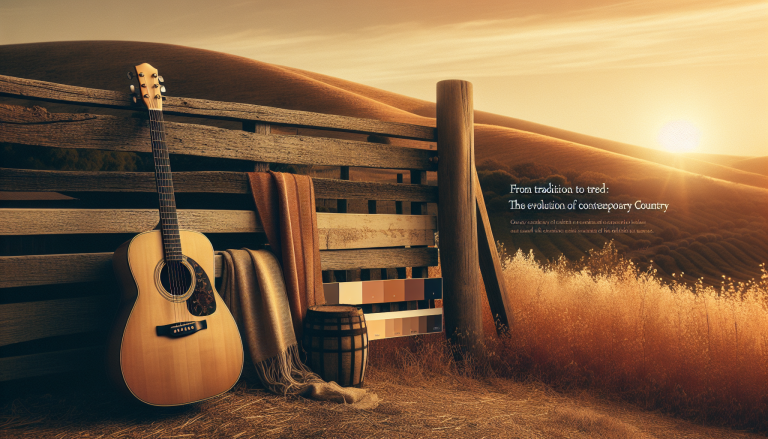The Roots and Rise of Contemporary Country Music
Country music, with its deep, resonant roots in the American South, has long told the stories of everyday life — heartbreak, hope, faith, and the land that cradled those tales. By the late 20th century, a fresh wave of artists began breathing new life into this rich tradition, blending it with a modern sensibility and broader musical influences. This evolution gave rise to what we now lovingly call contemporary country music. It’s a vibrant genre that pulses with the heartbeats of classic country’s storytelling and the electric spark of pop, rock, and beyond.
From Traditional String to Electric Pulse: The Historical Context
The story of contemporary country music is a tale of transformation. Traditional country, once dominated by fiddles, steel guitars, and acoustic storytelling, began shifting in the 1970s and 1980s. Nashville’s studios witnessed an infusion of crossover sounds. Artists like Dolly Parton and Kenny Rogers blurred lines, bringing country onto pop charts and widening its appeal without abandoning its soul. The 1990s marked a seismic moment: country music was no longer tucked away in honky-tonks and rural corners but reigned in stadiums and on global airwaves.
This era’s artists maintained the storytelling heart of country music—the authentic narratives of Americana and human experience—while embracing contemporary production, catchy hooks, and electric instrumentation. It was a bold embrace of change that preserved country’s roots while lighting a new path forward.
The Sound of Today: Defining Contemporary Country Music
At its core, contemporary country music is a tapestry woven from the genre’s earliest threads, combined with fresh colors pulled from pop, rock, and even hip-hop’s rhythmic sensibility. It’s characterized by clean production, upbeat tempos, and a versatile mix of instruments: traditional fiddles and banjos alongside electric guitars and polished drum tracks.
But what truly defines contemporary country is its lyrical approach—still anchored in storytelling but often broader in theme. Love, loss, rural pride, and resilience remain staples, but there’s also a newer focus on personal empowerment, celebration of small-town life, and heartfelt reflection. Contemporary country embraces a musical accessibility that invites listeners from all walks of life to find connection through shared emotion.
Voices that Shape the Sound: Key Artists and Groups

Few voices resonate through contemporary country music like that of Carrie Underwood. Her soaring vocals and compelling narratives have redefined what it means to be a female artist in this space—from tender ballads to anthems of strength, she weaves emotion and power seamlessly. Alongside her, artists like Keith Urban and Brad Paisley bridge the worlds of country storytelling and guitar virtuosity, their strings narrating stories as vividly as their lyrics.
Luke Bryan is another pillar, his everyman charm and playful, sun-kissed tunes capturing the spirit of modern country life, while Kacey Musgraves has garnered acclaim for blending traditional instrumentation with sharp, introspective lyricism about finding beauty and truth in unconventional places.
Groups like Lady A and Little Big Town bring rich harmonies and thoughtful songwriting, amplifying the genre’s collaborative spirit. Together, these artists push country music’s boundaries while honoring its heritage, creating a sound as varied and layered as America itself.
Hits that Define and Inspire: Notable Songs and Albums
“Before He Cheats” by Carrie Underwood is much more than a chart-topper; it’s an empowering anthem that speaks to universal themes of heartbreak and revenge, wrapped in an unforgettable melody. Her album *Some Hearts* introduced many to this new era of country music—raw emotion wrapped in pop accessibility.
Keith Urban’s *Ripcord* offers a sonic palette that stretches from tender ballads like “Blue Ain’t Your Color” to upbeat jams such as “John Cougar, John Deere, John 3:16,” marrying craftsmanship and storytelling in every note.
Kacey Musgraves’ *Golden Hour* redefined contemporary country’s poetic possibilities. With gentle steel guitars and intimate lyrics, songs like “Butterflies” shimmer with vulnerability and wonder, inviting listeners into a warm, reflective space.
Luke Bryan’s *Crash My Party* album remains a staple for anyone wanting a soundtrack to laid-back nights and summertime memories, while Lady A’s “Need You Now” is a masterpiece of longing and lush harmonies, echoing across genres and generations.
The Lasting Effects: Contemporary Country’s Place in American Music
Contemporary country music stands as a living bridge between traditions and innovation—a genre that honors its storied past while embracing the global and modern world. It has expanded country music’s reach, welcomed diverse audiences, and fostered a new generation’s love for songs that feel deeply personal and yet universally relatable.
Its impact on American music is profound. By melding storytelling with crossover styles, contemporary country has helped dissolve genre boundaries, encouraging collaboration and creative growth. It’s not only sustained the genre’s relevance but enriched America’s musical fabric, asserting country music’s timeless voice amid an ever-changing cultural soundscape.
As a warm storyteller, country music’s charm lies in its ability to lift the everyday into poetry, its instruments weaving emotions that words alone cannot capture. Contemporary country music continues this legacy, a testament to the heart and soul of American music—a genre that sings the stories of our lives, today and always.